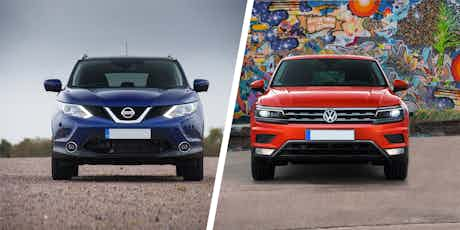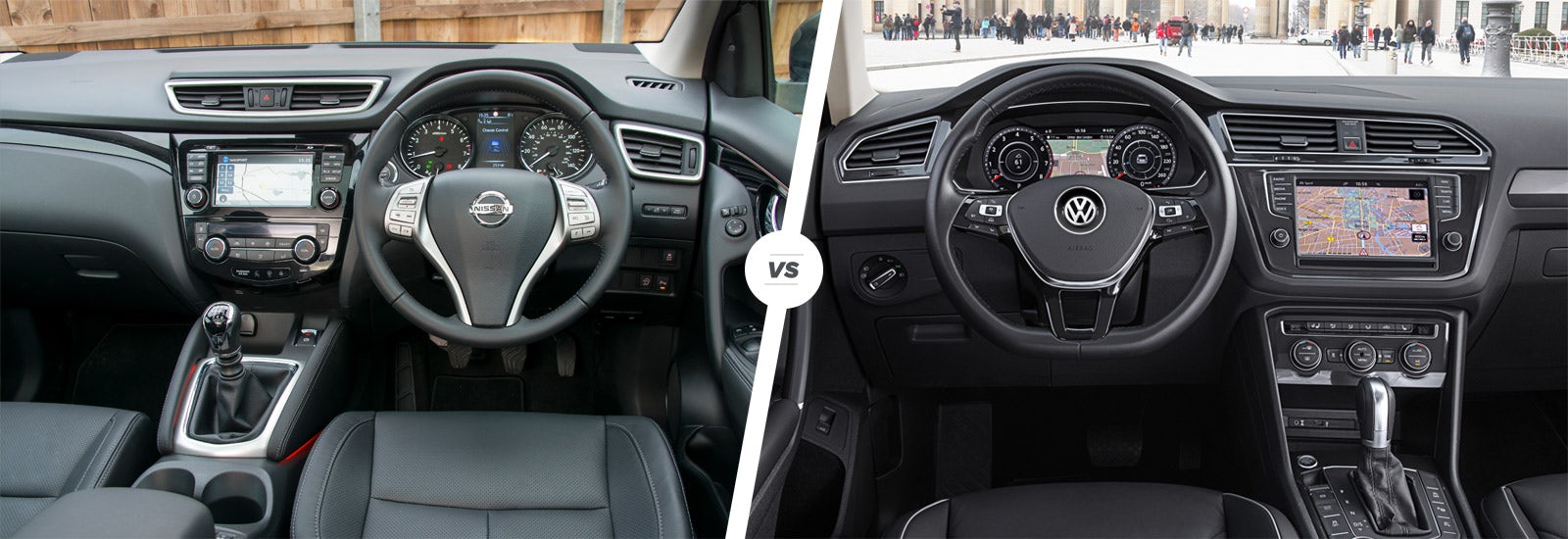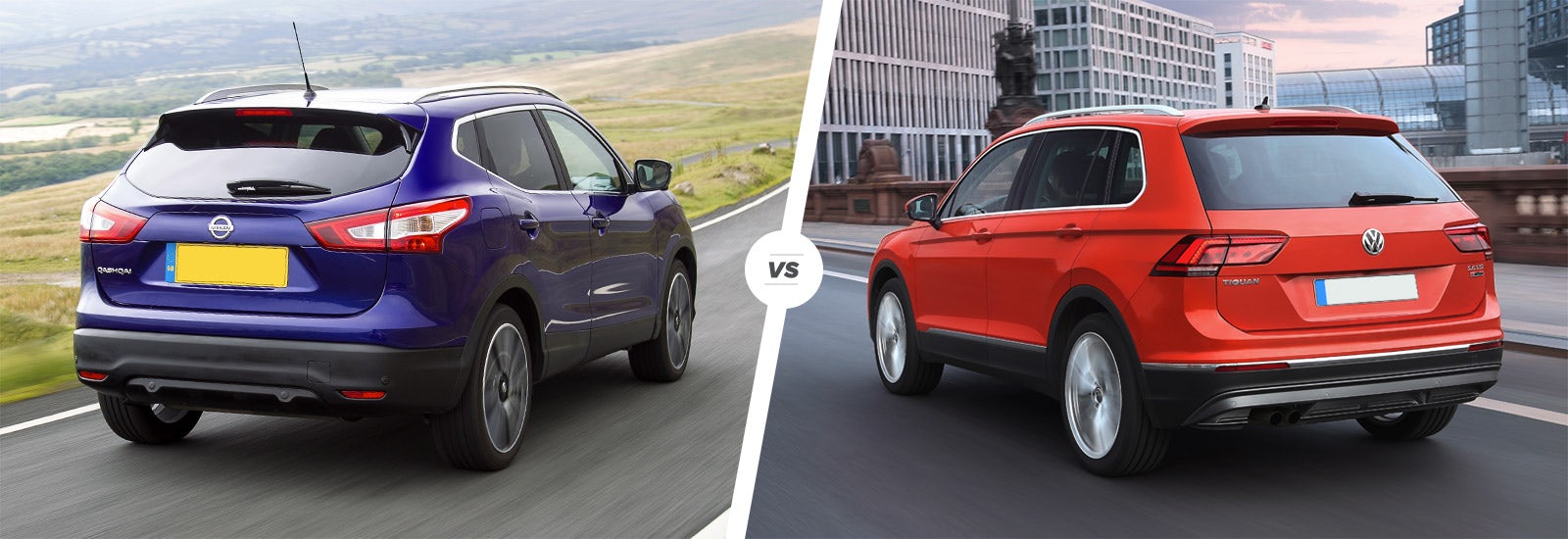Nissan Qashqai vs VW Tiguan SUV comparison
April 25, 2016 by carwow staff

One of the latest crossovers to arrive on the scene is the new Volkswagen Tiguan. It’s pitched as a more premium alternative to the Nissan Qashqai but how do the two compare? We compared them side-by-side to help you decide which is best.

Nissan Qashqai vs VW Tiguan – styling
The Nissan Qashqai was one of the first crossovers to go on sale and has become one of the best selling cars in the UK. Its handsome styling has certainly contributed to its success but, despite a bold grille and swollen wheel arches, it’s unlikely to set any pulses racing.
The Tiguan, meanwhile, is the latest example of Volkswagen’s simple, understated styling. There’s an undeniable classiness to the detailing – the way the grille’s wide chrome bars flow almost seamlessly into the headlights, for example – and the lack of any radical styling flourishes means it’ll probably age gracefully.

Nissan Qashqai vs VW Tiguan – interior
Both these tall family cars offer plenty of cabin space and a high driving position, resulting in a commanding view of the road ahead. Much like the cars’ exteriors, neither dash is particularly exciting to look at, but they’re both very well-built.
Those who regularly carry passengers should look no further than the Tiguan. Occupant space in both the front and rear is generous, while the rear seat bench can slide back and forth by 170mm to alter the balance between boot space and rear legroom.
The Tiguan’s boot is huge, too. At 610 litres, the Volkswagen’s load bay is 180 litres larger generous than the Nissan, and a quick jump in the back seats shows that this volume hasn’t come at the expense of passenger leg room, either.

Nissan Qashqai vs VW Tiguan – driving
The Tiguan is based on the firm’s MQB platform – a highly versatile structure that underpins numerous vehicles in the Volkswagen, Audi, Skoda and SEAT ranges. Despite improvements in safety equipment, the new car weighs, on average, 50kg less than the equivalent outgoing model across the range. Meanwhile, the stiffer chassis has allowed Volkswagen to relax the suspension firmness slightly, making the new model more comfortable than ever.
When it comes to ride quality, however, few cars in the class can compete with the Qashqai. On all but the largest wheel options, the Nissan feels utterly relaxed and smooth, even over rough road surfaces. Likewise, the Qashqai asks very little of the driver on the move – all the controls respond in a linear and predictable manner and, while it’s no sports car, it never feels unwieldy.

Nissan Qashqai vs VW Tiguan – engines
Considering outgoing Tiguan diesels outsold petrol equivalents by nine to one, Volkswagen will probably offer a TDI-biased range for the latest model, too. Power outputs are set to range from 113 to 237hp. The most powerful engine is a twin-turbocharged 2.0-litre unit that already sees service in the Passat. Tweaks to each engine and the car’s reduced weight sees fuel efficiency improve by a claimed 24 per cent compared to its predecessor.
The Nissan offers a more modest range of engines. Basic models are powered by a quiet 1.2-litre turbocharged petrol that delivers adequate performance and fuel economy of 50.4mpg. The pick of the range, however, is the 109hp, 1.5-litre unit. It’s both smoother and more frugal than the larger 1.6-litre engine and able to return 74.3mpg.

With these cars flaunting SUV-type looks, it should come as little surprise that both are available with four-wheel drive. The Volkswagen takes the SUV game much more seriously, however, with all but the most basic models sending power to all wheels as standard.
If you’re after a four-wheel drive Qashqai your only option is a highly specced 1.6-litre diesel model. Unless you live on a farm, we’d probably avoid it – the 4×4 Qashqai is less economical to run and the extra weight makes it slower, too.

Nissan Qashqai vs VW Tiguan – verdict
For most buyers, the Nissan’s low running costs and cheap purchase price make it more appealing than the Tiguan. It also offers fantastic safety, solid reliability and sturdy build quality – everything the modern family needs.
The Tiguan, however, does all that while also offering a little more of what the modern family wants. It’s more stylish than the Qashqai, faster on the road and gets desirable four-wheel drive on more models. It’s also the best choice if you want an automatic gearbox because the Qashqai’s noisy CVT unit can’t compete with the refinement of VW’s DSG unit. If you can stomach the higher price, we reckon the Tiguan is the one to go for.
Save money on your next SUV
Check out the great deals on offer in our Nissan Qashqai configurator and Volkswagen Tiguan configurator. If you still haven’t picked your next car check out our car chooser and deals page.















